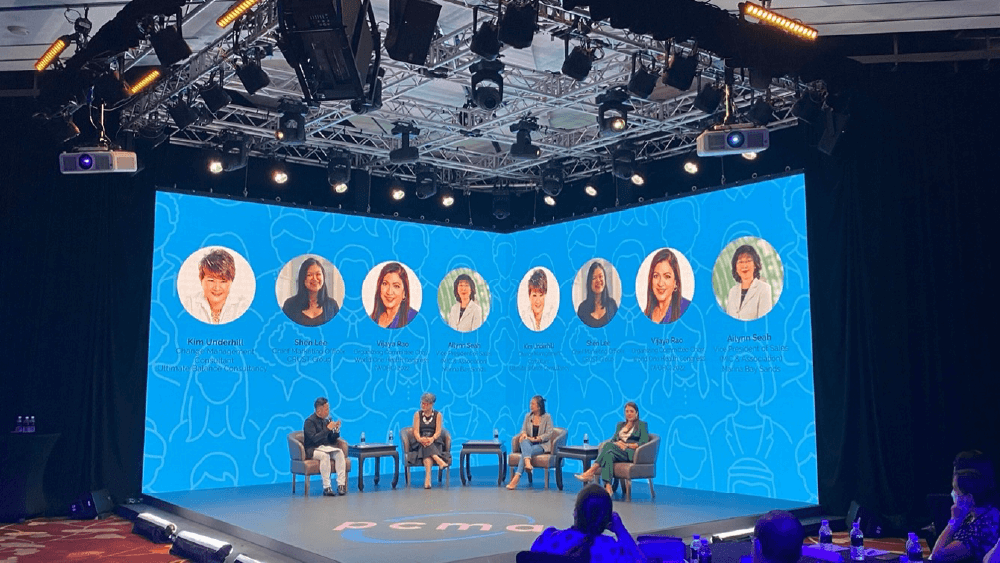In June, Women in Association: Leaders of Tomorrow, had over 70 people tune in digitally and attend in-person to brainstorm actions that could advance women and activate a future-shaping leadership mindset.
The event created in collaboration with BEAM and powered by Marina Bay Sands, saw experienced and emerging leaders in the Asia Pacific region discuss the hurdles women in leadership need to overcome and the development of women leaders. This insightful discussion was followed by a brainstorming workshop to reimagine these topics with the participants. A highly experienced panel shared examples to illustrate these discussions.
Here are some highlights from each of the topics.
Hurdles
Unequal opportunities based on gender discrimination must be dealt with on an individual and collective level. Nicki Kenyon, Director, POWERED ENTERPRISE Nine Entertainment Network, believes: “We can create the opportunity by asking for it, finding the courage to step forward knowing that we are entitled to every opportunity.” However, sometimes traditional workplace and societal structures make this hurdle harder to overcome.
Dianne Smith, CEO of Industry Capability Network, added another viewpoint that regulations and policies promoting equal opportunities play a part too.
“Organisations should not wait for the law to mandate protections and incentives to see equality in the workplace, they should do it because it is morally right, and it is good for their brand.”
Organisations should also look to bolster the efforts to address the issue of equal pay. Laura Deal Lacey, Executive Director, Milken Institute Asia Center, advised that a “benchmark should be set on salaries according to the role, not based on salary history, because if you ask about their salary history you are bringing all the history of the gender gap issue into the situation.”
This two-pronged approach applies to hurdles that women face regularly. Individuals must work with their organisations to create an environment that is free from unacceptable and inappropriate behaviour. A strict zero tolerance policy and formal communication channels should be created for women to speak up, instead of sweeping issues under the rug due to the fear of repercussion. Nicki said, “As a society there must be protective processes for someone who is brave enough to speak up.” To which Laura added, “We grew up in the generation where we didn’t say anything if something was wrong, we want the next generation to have a safe environment and it starts with the leadership of every organisation to set the tone and benchmark.”
Leadership Development
Many leaders, both men and women, are faced with a deep-seated feeling of insecurity and that they are inadequate for the role they are assigned, this is known as imposter syndrome.
Shen Ming Lee, CMO, CRUST Group said she manages her confidence by approaching obstacles with curiosity and a mindset that new breakthroughs have new challenges. “Change the extrinsic outlook on yourself to an intrinsic one, focus on being better instead of looking good and turn that insecurity into motivation.” This extrinsic outlook also comes from social comparison and judgement.
Vijaya Rao, Organising Committee Chair of World One Health Congress 2022, said we must deal with the unrealistic expectation of perfection that causes us unnecessary stress. She shared a psychological approach, Rational Emotive Therapy, which justifies having: “qualities within yourself that brought you to where you are, so when you suffer in the next stage, you need to look at what determinants of expertise brought you here.” Vijaya also suggested creating support networks that you resonate with and can be comfortable in an informal setting.
Beyond support groups, mentorships are important for developing leaders as well. Kim Underhill, Director, Ultimate Balance Consultancy, shared her frame of a successful mentorship, as someone who inspires you and is someone who you aspire to become, usually in your industry. She posed her considerations, “Do your values align? Do you see their life and career as where you want to go?” as she explained that definitions of success differ for individuals.
Sometimes mentors are difficult to approach but we must overcome that hesitation. The panel shared their perspectives as both mentors and mentees, with mutual learning as the key factor for a successful long-term mentorship.
Want to hear the full session? Sign up now to become a member of PCMA and get an all-access pass to a wealth of resources, events and to be connected to an established global network of business event professionals.

